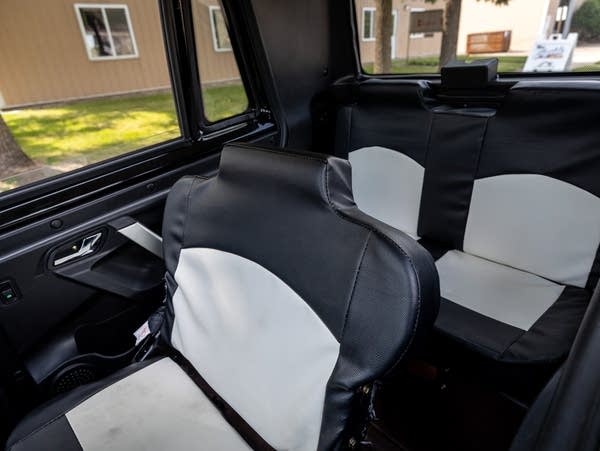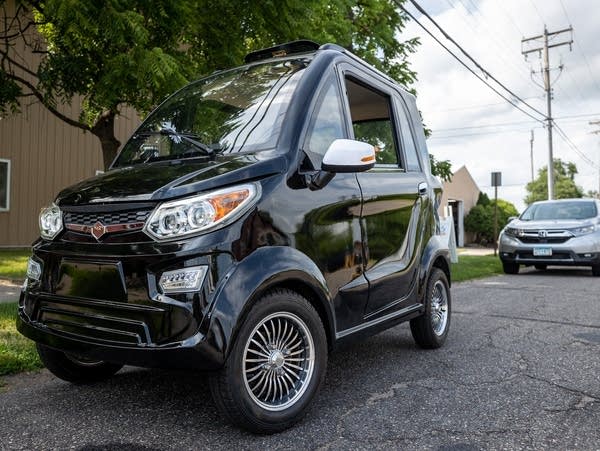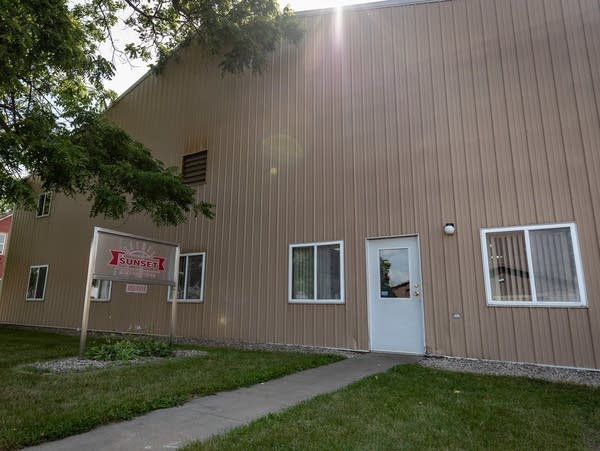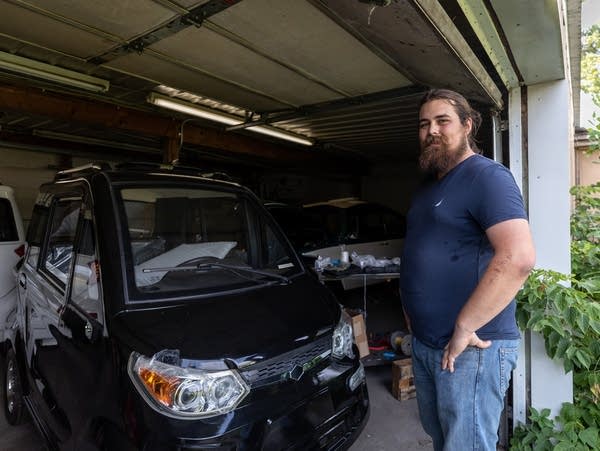St. Joseph company aims to bring little electric cars to city streets

Go Deeper.
Create an account or log in to save stories.
Like this?
Thanks for liking this story! We have added it to a list of your favorite stories.
Tom Skahen is used to turning heads when he cruises through downtown St. Joseph.
Scooting past the SUVs and pickups that are common in central Minnesota, Skahen's pint-sized black car stands out.

"Without exception, I get rubbernecking and waves pretty much everywhere I go,” he said.
Skahen is CEO of Opus Motorcar Co. in St. Joseph, an innovative company that is selling small, low-speed all-electric vehicles designed for short trips around town, to the grocery store or picking up the kids from school.
Turn Up Your Support
MPR News helps you turn down the noise and build shared understanding. Turn up your support for this public resource and keep trusted journalism accessible to all.

With a top speed of 35 miles per hour, the three-passenger Opus No. 3 looks like a cross between a London cab and an early Smart car. It can travel about 25 miles on a single charge.
Opus’ vehicles may be small, but the 25-year-old Skahen has big ambitions for shaking up how people think about local transportation.
After earning a degree in aerospace engineering from the University of Minnesota in 2020, Skahen said he got interested in micro-mobility — small, lightweight electric vehicles designed to travel at low speeds to nearby destinations. They typically have a hub motor, the kind in electric scooters and e-bikes.
In some countries such as China, such vehicles are widely popular, Skahen said. But people have run into problems when they’ve tried to import them into the United States.
“We thought, ‘Well, it can't be that hard,” he said with a wry laugh. “Two or three years later, we're just going on sale."
Skahen partnered with his father, Sean, who owns a third-generation manufacturing business in St. Joseph, to launch Opus Motorcar Co.
They import cars that are mostly assembled, then install the batteries and make a few other modifications. Skahen said it's a low-risk way to gauge consumer interest. Eventually, they hope to manufacture small electric vehicles in Minnesota, plus sell conversion kits for some Volkswagen models.

The latest model, Opus No. 3, is large enough for Skahen's 6-foot-2 frame to fit comfortably in the driver's seat.
It’s like a golf cart with amenities, including a roof, a heater, power windows, keyless entry, rearview camera and Bluetooth connectivity.
At $7,500, the price tag is significantly smaller than a traditional vehicle. It can be charged by plugging into a standard electrical outlet, and costs just three cents a mile to operate, Skahen said.
According to national studies, almost half of all car trips in the U.S. are less than three miles. With the price of gas and new vehicles on the rise, Skahen thinks more people will be looking for low-cost alternatives for those short drives.
"We're under no illusion that this is like a silver bullet for transportation,” he said. “But there's clear market demand for it.”

The price of batteries for e-vehicles has been falling, said Will Northrop, a mechanical engineering professor at the University of Minnesota’s Center for Transportation Studies. That’s sparked an increase in electrified transportation options, from e-scooters and hoverboards up to full-sized Teslas, he said.
“It's a new world out there in terms of mobility options for people,” Northrop said. He said the high price of gas likely will fuel more interest in small e-vehicles that use less energy per mile.
“These hub motors are pretty prolific,” he said. “You can get them from China, they're produced all over the place and a lot of people are able to put together these vehicles. So there's a lot of small companies that are starting up in this area.”
A small town in rural Minnesota might seem like an unusual place to market e-vehicles.
But Skahen said St. Joseph, about eight miles west of St. Cloud, is not only his hometown but also a good fit for Opus. It has a growing downtown lined with shops, breweries and restaurants and well-educated residents interested in innovative modes of getting around.

"People are driving around golf carts, they're driving around side-by-sides and ATVs, e-bikes, snowmobiles during the winter,” Skahen said. “There's all kinds of enthusiasm about different ways to get around that don't necessarily require you to take the whole car out of the garage."
The company has local supporters, including Nate Keller, St. Joseph’s community development director. He said Opus offers mobility to people who don't have the means to purchase a more traditional car or truck, and fits in with the city’s goals of sustainability and equitability.
"It's a very efficient way to not only get around and do small errands, but it's also economical,” Keller said. “We talk about access to vehicles and trying to be more equitable. And I think that they have a solution that can provide that and bridge a lot of gaps."
Challenges
But there are obstacles to the little electric cars hitting the mass market, including local traffic laws.
They’re currently designed primarily for off-road use and are permitted on streets in St. Joseph, St. Paul, Wayzata, Sartell and a few other cities that allow golf carts or neighborhood vehicles. But they’re not street legal in every city.

Also, Opus also encounters skepticism from people accustomed to larger automobiles. Some of the comments on Opus’ social media are brutal.
“It will be great in Minnesota snow, LOL," one person wrote on Facebook. And another: "Do you stand a chance in a crash, or is it ‘call the coroner?’”
Skahen said he understands the skepticism.
“It's not a highway vehicle, and it's not an e-bike,” he said. “It's relatively unproven outside of some small niche communities.”
Skahen spends a lot of time explaining that the cars’ winterized batteries can handle the cold. They have regular safety features, including seat belts, signals, windshield wipers and lights. And they’re not intended to be driven on busy highways or county roads.
Skahen said it will take time for people to get used to seeing the vehicles on city streets.
But he thinks in St. Joseph and cities across the U.S., people are reevaluating what they really need to get where they need to go.
Some of the same people who posted critical comments about Opus cars also asked for a test drive, he said.
“Micro mobility, with these e-bikes, it's caused so many people to reevaluate how can I change my commute? Do I need a car for all of this?” Skahen said. “And that's the first step.”



